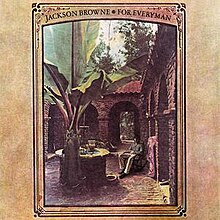For Everyman
| For Everyman | ||||
|---|---|---|---|---|
 |
||||
| Studio album by Jackson Browne | ||||
| Released | October 1973 | |||
| Recorded | 1973 | |||
| Studio | Sunset Sound, Hollywood, California; Studio One | |||
| Genre | Rock | |||
| Length | 41:13 | |||
| Label | Asylum | |||
| Producer | Jackson Browne | |||
| Jackson Browne chronology | ||||
|
||||
| Professional ratings | |
|---|---|
| Review scores | |
| Source | Rating |
| Allmusic | |
| Robert Christgau | (B) |
| Rolling Stone | (no rating) |
For Everyman is the second album by American singer/songwriter Jackson Browne, released in 1973 (see 1973 in music). The album peaked at number 43 on the Billboard 200 chart and the single "Redneck Friend" reached number 85 on the Billboard Hot 100 chart. In 2003, the album was ranked number 457 on Rolling Stone magazine's list of the 500 greatest albums of all time.
For Everyman marked the debut of multi-instrumentalist David Lindley's long association with Browne. Guest artists included David Crosby (harmony on the title track), Glenn Frey (harmony on "Redneck Friend"), Elton John (credited as Rockaday Johnnie, piano on "Redneck Friend"), Don Henley (harmony on "Colors of the Sun"), Joni Mitchell, and Bonnie Raitt.
The title track was written by Browne in response to the apocalyptic "Wooden Ships", a song written by Crosby, Stephen Stills and Paul Kantner. His own version of "These Days" appears here after having been previously recorded by Nico, Tom Rush, who also covered "Colors of the Sun", and Gregg Allman. Nico was the first to record the song in 1967. Browne later commented "When [Allman] did [These Days] I thought that he really unlocked a power in that song that I sort of then emulated in my version. I started playing the piano. I wasn't trying to sing it like Gregg; I couldn't possibly. I took the cue, playin' this slow walk. But it was written very sort of, kind of a little more flatpicking." "Take It Easy" was written by Browne and Frey and became the Eagles' first single, released on May 1, 1972.
...
Wikipedia
